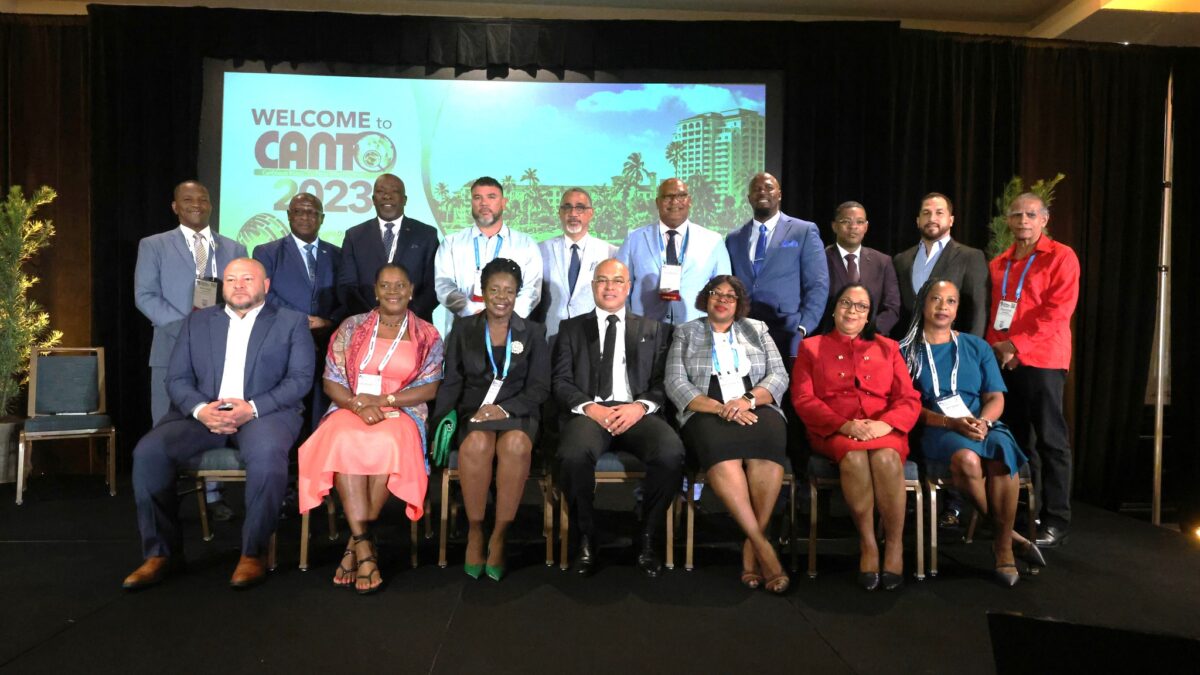“A light touch!” T&T’s Regulatory Position on Challenges in the Telecoms and ICT Arena
Miami, Florida Trinidad and Tobago’s approach to the regulatory management of the telecommunications and ICT sector is to provide “a light touch,” so says Ms. Denyse White, Deputy National Chief Digital Officer at the Ministry of Digital Transformation on the twin-island state. Ms White represented her country on the CANTO’s Ministerial Roundtable on Day one of the CANTO 38th Annual Conference and Trade Show taking place at the JW Marriott Turnberry Resort & Spa, in Miami, Florida, USA.
Ms White was a part of a three member panel comprising the Hon. Michel Chebat, Minister of Public Utilities, Logistics & E-Governance, for the government of Belize and the Hon. Charles Cooper, Minister of Traffic, Transport & Urban Planning of Curaçao discussing the topic Support for ICT Development and its People. The panel was moderated by CANTO Director and Head of Regulatory Affairs for Cable and Wireless Communications in the Caribbean, Mr David Cox.
Responding to a question posed by the panel’s moderator on the issue of the non-contribution of Over the Top (OTTs) providers or Big Tech firms to either corporate taxes or the funding of infrastructure development in the region, Ms White said the policy approach of the Trinidad and Tobago’s government is “to provide enough structure so that things can develop organically…giving enough safeguards so that there is order to the environment.”
Caribbean telecom operators have been advocating for OTTs such as Google, Netflix and TikTok and the like, which account for more than sixty percent of the data traffic on broadband networks in the region. to pay their fair share for the development of said network infrastructure. Caribbean telecom operators say that while they have invested more than US$500,000 annually or 0.5 percent of regional Gross Domestic Product (GDP) in network upgrades and improvements since 2017, they are facing plummeting revenues from their traditional lines of business and only modest returns in other areas. Ms White explained that while the sustainability of the telecom operators is a concern, a country must be careful not to over legislate but provide a framework that is sufficiently agile to take into account the rapidly evolving nature of the sector. “We need to find that sweet spot where other and alternative business models are allowed to thrive while setting the ground for traditional operators to continue to provide services and expand into areas that they see as important for the country” Ms White added.
Also contributing to the dialogue was the Hon. Micheal Chebat- Minister of Public Utilities, Logistics, & E-governance for Belize who praised the contribution of CANTO in providing the information and support his nation required to drive its digital transformation initiative. He said that the impact of OTTs, getting broadband networks into remote and rural areas, electrification of rural areas in support of development initiatives including the deployment of broadband internet cabling, and the crafting of legislation that will promote the continued growth and investment in the telecoms and ICT sector are some of the issues facing his nation. He said while Belize has ninety-eight percent (98 percent) broadband coverage, the remaining two percent comprises rural women and youth at risk, a gap the his government is therefore determined to close. Belize has also provided training for five cohorts of public servants to ensure they can deliver government’s service using the technology. Digital connect centres have also been established to offer both internet access and training to the youth and elderly in a bid to improve national digital literacy.
The Hon. Charles Cooper- Minister of Traffic, Transport & Urban Planning, for the government of Curaçao indicated that his government’s vision is to make Curaçao the digital hub for the Caribbean. It hopes to join forces with other Caribbean nations to offer various digital services and products to the world. Curaçao is also well connected with over ninety percent (90%) of households having access to broadband internet services.
The day’s Keynote Address entitled Connectivity Commitment, Care – The Future of Telecoms was delivered by Mr. John Winter, Senior Vice President, Liberty Latin America (LLA). He told the Conference that internet traffic worldwide has increased by as much as thirty percent (30%) since the onset of the pandemic in 2020 and that telecoms have a responsibility to fast track connectivity for the Caribbean. As many as fourteen million Caribbean people are still without connectivity. The reasons for the connectivity gap are varied including affordability, the high cost of infrastructure deployment in rural and remote areas and negative impact of natural disasters on existing infrastructure. He noted in some areas consumer skills and readiness because of slow adaptation and/or distrust of digital advancement also played a role in the existing connectivity gap. He urged governments to partner with network operators to bridge the divide as the ICT sector accounts for as much as 10% of the gross domestic product (GDP) of the region. A reliable supply of energy/electricity in some territories was also among the challenges making access to a reliable broadband service difficult, Mr Winter added. Noting when power goes down, networks go down and telecom operators are blamed for the service failure. The Cable and Wireless Communication group will be exploring the option of placing solar panels next to their towers in a bid to provide reliable power supply and offer back-up support in territories so affected such as Jamaica.
The Conference also explored the power of telecoms and ICTs to revolutionise the health sector via a panel discussion on the theme Unleashing the Power of TeleHealth. Moderator Carol Robertson, Senior Business Development Partner, C&W Business led a competent panel comprising Dr. David Walcott MD, PhD, MSc, Founder and Managing Partner, Novamed, Ezechiel Fenelon, MPH, MPAP, MS, Co-founder, DocMobil, Danielle Mullings, Software Engineer, Documentary Maker and Youth Leader and W.B. “Mitch” Mitchell, Group Vice President, Government Solutions, Amwell. Dr David Walcott told the gathering that with over eighty percent (80%) of deaths in Caribbean a result of non-communicable diseases, together with an ageing population whereby in the next ten years the number of persons over sixty-five (65) years of age will increase by more than fifty percent (50%); neither the public nor private sectors had the capacity or funding to adequately manage the burdens that these two scenarios brought. He noted that Telemedicine and Telehealth offered physicians the added option of meeting virtually with their patients enabling better disease management and patient support. And while adoption of the added patient care option may be slow on the uptake across some territories in the region, the benefits of the service should not be underestimated, Mr Ezechiel Fenelon noted.
The role and place of Wi-Fi – The Invisible Evolution was also explored via a panel discussion moderated by Ms. Melesia Sutherland, Director, CANTO and Head of Regulatory and Government Affairs for FLOW’s northern Caribbean cluster. Joining her was Sam Naoshy, Senior Director – CVP & Go-To-Market Lead, Cable and Wireless Communications and Kim Rooper. Ms Rooper said that that Wi-Fi grows year on year by eighteen percent (18%). From a business perspective, she went on, organisations are using internet for productivity, migrating applications to cloud, and the like. Businesses, she said, are also leveraging Wi-Fi infrastructure to do more. They are using it for back office operations, energy saving initiatives, the Internet-of-Things in asset management such as fleet and inventory control and the monitoring of devices, remotely. As such reliability and security of service is being demanded of operators. Telecoms therefore seek to offer both a reliable, and scalable service, There service also includes location analytics which aids businesses to monetise their investment in Wi-Fi by understanding foot traffic and demographics of users in order to push products and services to them.
In the residential space Mr Sam Noashy said that the supply of Wi-Fi service is built around an understanding of who the customer is and what their needs are. Caribbean customers often require wall-to-wall coverage, reliability in that the service should be as fast as it can possibly be with continuous connection, and control and customisation. Some firms have already included mobile applications that will allow customers to control their experience and even implement parental controls as part of their service offerings.
The Gender Diversity in Cybersecurity-Women in ICT Committee panel discussion led by moderator Dr. Kim Mallalieu, Vice Chair, Network of Women in International Telecommunication Union (ITU) & Senior Lecturer, The University of the West Indies together with panelists: Ms. Kamla Hamilton, Senior Product Manager, Security Solutions, C&W Business; Ms. Shakera Rolle, Director of Information Security, Cable Bahamas; and Ms. Korah-Jane Jude Grant, Director – Business Development & Culture, Symptai considered the the under representation women in the sector. They also explored strategies to encourage more women and girls to consider careers in the telecom and ICT sector.
-END-


